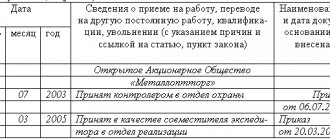New edition of Art. 72.2 Labor Code of the Russian Federation
By agreement of the parties, concluded in writing, an employee may be temporarily transferred to another job with the same employer for a period of up to one year, and in the case where such a transfer is carried out to replace a temporarily absent employee, whose place of work is retained in accordance with the law , - before this employee goes to work. If, at the end of the transfer period, the employee’s previous job is not provided, and he did not demand its provision and continues to work, then the condition of the agreement on the temporary nature of the transfer loses force and the transfer is considered permanent.
In the event of a natural or man-made disaster, industrial accident, industrial accident, fire, flood, famine, earthquake, epidemic or epizootic, and in any exceptional cases threatening the life or normal living conditions of the entire population or part of it, the employee may be transferred without his consent for a period of up to one month to work not stipulated by the employment contract with the same employer in order to prevent these cases or eliminate their consequences.
Transfer of an employee without his consent for a period of up to one month to a job not stipulated by an employment contract with the same employer is also permitted in cases of downtime (temporary suspension of work for reasons of an economic, technological, technical or organizational nature), the need to prevent destruction or damage to property or temporary replacement an absent employee, if downtime or the need to prevent destruction or damage to property or to replace a temporarily absent employee is caused by emergency circumstances specified in part two of this article. In this case, transfer to a job requiring lower qualifications is permitted only with the written consent of the employee.
When transfers are made in cases provided for in parts two and three of this article, the employee is paid according to the work performed, but not lower than the average earnings for the previous job.
Commentary on Article 72.2 of the Labor Code of the Russian Federation
To change the terms of the employment contract that determines the place of work, written consent to the transfer must be obtained from the employee. However, for a temporary transfer on the grounds provided for in parts 2 and 3 of Article 72.2 of the Labor Code of the Russian Federation, obtaining such consent is not required, provided that the employee is offered a job that does not require lower qualifications.
Thus, if the employer sees the need to change the above conditions of the employment contract and this is not related to the circumstances provided for in parts two and three of Article 72.2 of the Labor Code of the Russian Federation, then he, first of all, should notify the relevant employee about this. For this purpose, the employer must send the employee a proposal, the essence of which is the employer’s motivated intention to change the content of the work (labor function) previously assigned to the employee or to transfer the employee to permanent work at another enterprise (to another location together with the enterprise). In the proposal, the form of which can be either written or oral, it is also advisable to state the motives that guide the employer. In addition, the proposal should presumably contain information about the expected timing of changes to the terms of the employment contract, as well as the time available to the employee to express his opinion on this matter.
The basis for changing the terms of the employment contract in the above situations is an agreement between the employee and the employer, concluded in addition to the employment contract and subsequently considered by the parties to the employment relationship as its integral part. If the employee, for one reason or another (which he, however, is not obliged to name), expresses his disagreement with the employer’s proposal, the terms of the employment contract remain valid in their original form.
If necessary, the employee’s opinion can be brought to the attention of the employer in writing (for example, in a statement). At the same time, we emphasize that the employer does not have the right to exert any pressure on an employee who has expressed disagreement with the proposal to change the terms of the employment contract.
As mentioned above, the transfer of an employee to another workplace (to another structural unit) located in the same area does not require consent, if none of the previously determined terms of the employment contract changes.
At the same time, we note that changing the terms of the employment contract that determines the place of work is impossible if the employee is expected to be transferred (moved) to a job that is contraindicated for him due to health reasons. In this case, the circumstances making the transfer (relocation) unacceptable must be documented.
Article 72.2. Temporary transfer to another job
1. Article 72.2 is specifically devoted to temporary transfer to another job. It provides for the possibility of temporary transfer to another job by agreement of the parties (Part 1) and at the initiative of the employer without the consent of the employee in cases provided for by law (Parts 2, 3).
2. In accordance with Part 1 of the commented article, by agreement of the parties, concluded in writing, an employee may be temporarily transferred to another job with the same employer. The law does not name specific grounds on which such a transfer is allowed, and therefore it is possible for any reason, incl. both for a vacant position (place of work) with a given employer, and to replace a temporarily absent employee within the period established by law. As a general rule, this period should not exceed one year. An exception is established for cases of transfer to another job to replace a temporarily absent employee, who, in accordance with the law, retains his place of work. In this case, the transfer period may be more than one year. It depends on the time the replaced employee returns to work.
However, within the one-year period established by law, the parties must determine a specific period during which the employee will perform work not stipulated at the conclusion of the employment contract.
It should be noted that in practice this rule is not always observed. There are often cases when the following entry is made in an order for transfer to another job: “transfer to a position ... for a period of up to one year.” This practice cannot be considered legal, because it does not comply with Part 1 of Art. 72.2, which directly states the end of the transfer period. Moreover, it places the employee in a very uncertain position for a long period.
Upon expiration of the period of temporary transfer to another job determined by the parties, the employer may, and at the request of the employee is obliged to provide him with the previous job. However, if the temporary transfer period has expired, and the employee does not insist on providing the previous job and continues to work, then the condition on the temporary nature of the transfer loses force. In this case, work in the position (profession, specialty) to which the employee was temporarily transferred is considered permanent for him and the employer does not have the right to transfer him to his previous or another job without the employee’s consent.
3. A temporary transfer to another job to replace an absent employee should be distinguished from the performance by an employee, on behalf of the employer, of the duties of a temporarily absent employee, along with work stipulated by an employment contract. If a temporary transfer to another job is allowed both for a vacant position (place of work) and to replace a temporarily absent employee whose position (place of work) is retained, then the employee’s performance of the duties of a temporarily absent employee without release from his main duties is allowed only for replacement an employee whose position (place of work) is retained (for example, during a business trip, vacation, temporary disability). The performance by an employee, on behalf of the employer, of the duties of a temporarily absent employee, along with the work stipulated by the employment contract, in contrast to a temporary transfer to another job, is not limited by any period. This period is determined by agreement of the parties. An agreement between the parties on a temporary transfer to another job cannot be terminated early unilaterally by the employee or the employer, as is the case when the employee, along with his work, performs the duties of a temporarily absent employee (see commentary to Article 60.2). However, this does not exclude the employee’s right to terminate the employment contract with the employer at his own request in accordance with the rules established by Art. 80 TK (see commentary to it).
4. Part 2 of the commented article provides the grounds on which the employer has the right to temporarily transfer an employee to another job not stipulated by the employment contract, without his consent. The law does not establish an exhaustive list of such grounds, but clearly defines their nature: these are exceptional cases that threaten the life or normal living conditions of the entire population or part of it. These include, in particular, natural or man-made disasters, industrial accidents, accidents, floods, and earthquakes.
Only in the presence of the specified emergency circumstances is it possible to temporarily transfer an employee without his consent to another job and in case of downtime, which is understood as a temporary suspension of work for reasons of an economic, technological, technical or organizational nature, as well as if it is necessary to prevent destruction or damage to property or to replacing an absent employee (Part 3 of Article 72.2). In other words, a temporary transfer of an employee without his consent to a job not stipulated by an employment contract can be considered justified only if it is necessary due to emergency circumstances that threaten the life or normal living conditions of the entire population or part of it. If the need for a temporary transfer of an employee to another job is caused, for example, by reasons such as equipment breakdown, untimely delivery of raw materials, and this is not caused by emergency circumstances provided for in Part 2 of the commented article, then such a transfer is allowed only by agreement of the parties.
At the same time, as explained in the Resolution of the Plenum of the Armed Forces of the Russian Federation dated March 17, 2004 N 2, when applying Parts 2 and 3 of Art. 72.2 of the Labor Code, which allows the temporary transfer of an employee to another job without his consent, courts should keep in mind that the obligation to prove the existence of circumstances with which the law connects the possibility of such a transfer rests with the employer (clause 17).
5. The duration of one (each) transfer to another job without the employee’s consent in cases where such a transfer is necessary due to emergency circumstances threatening the life or normal living conditions of the population should not exceed one month. However, such a translation may be repeated. This rule also applies to cases of temporary transfer to another job to replace an absent employee, i.e. transfer to another job to replace an absent employee due to emergency circumstances is not limited to one month during the calendar year.
The job to which the employee is transferred due to the above circumstances (including to replace a temporarily absent employee) must correspond to his qualifications. If in this situation a transfer to another job requiring lower qualifications is necessary, then such a transfer is permitted only with the written consent of the employee.
6. Temporary transfer of an employee to another job in all cases provided for in Art. 72.2, is allowed only with the same employer with whom he has an employment relationship. Moreover, when transferring an employee to another job without his consent, i.e. in cases provided for in Parts 2 and 3 of Art. 72.2, wages must be paid according to the work performed, but not lower than the average earnings for the previous job.
In all cases, transfer to another job that is contraindicated for the employee for health reasons is unacceptable.
7. Article 72.2 gives the employer the unconditional right to transfer employees without their consent to work not stipulated by the employment contract in exceptional cases that threaten the life or normal living conditions of the population. In this regard, the employee cannot refuse such a transfer if it is carried out in accordance with established requirements and the employee does not have valid reasons for refusing the transfer.
Refusal to perform work during a transfer carried out in compliance with the law is recognized as a violation of labor discipline, and absence from work is considered absenteeism.
However, it should be taken into account that by virtue of para. 5 tbsp. 219, part 7 art. 220 of the Labor Code, an employee cannot be subject to disciplinary action for refusing to perform work in the event of a danger to his life and health due to violation of labor protection requirements, except in cases provided for by federal laws, until such danger is eliminated or from performing heavy work and work with hazardous and (or) dangerous working conditions not provided for in the employment contract. Since the Labor Code does not contain rules prohibiting an employee from exercising this right even when the performance of such work is caused by a transfer due to emergency circumstances, the employee’s refusal to temporarily transfer to another job in accordance with Art. 72.2 for the above reasons is justified (see paragraph 19 of the Resolution of the Plenum of the Armed Forces of the Russian Federation dated March 17, 2004 No. 2).
Commentary to Art. 72.2 Labor Code of the Russian Federation
1. The duration of a temporary transfer to another job with a given employer, by agreement of the parties in writing, depends on the reasons for the transfer, after which, under the conditions specified in this article, the transfer will be considered permanent.
2. In the event of emergency, unforeseen circumstances (an approximate list of them is given), any exceptional cases, if the life or normal living conditions of the entire population or part of it are threatened, it is possible to transfer the employee without his consent for a period of up to one month to an unconditional an employment contract to work for the same employer to prevent these cases or eliminate their consequences.
3. Transfer of an employee without his consent for a period of up to one month to a job not stipulated by an employment contract with the same employer (to a job requiring lower qualifications - only with the written consent of the employee) is also possible in cases of production necessity for this employer caused by the specified above extraordinary circumstances.
4. When an employee is transferred due to emergency circumstances, payment for his work is made according to the work performed, but not lower than the average earnings for the previous job.
Article 72.2 of the Labor Code of the Russian Federation
Table of contents
Changes to the Labor Code of the Russian Federation
Quick search by articles
Comments on Article 72.2 of the Labor Code of the Russian Federation
By agreement of the parties, concluded in writing, an employee may be temporarily transferred to another job with the same employer for a period of up to one year, and in the case where such a transfer is carried out to replace a temporarily absent employee, whose place of work is retained in accordance with the law , - before this employee goes to work. If, at the end of the transfer period, the employee’s previous job is not provided, and he did not demand its provision and continues to work, then the condition of the agreement on the temporary nature of the transfer loses force and the transfer is considered permanent.
In the event of a natural or man-made disaster, industrial accident, industrial accident, fire, flood, famine, earthquake, epidemic or epizootic, and in any exceptional cases threatening the life or normal living conditions of the entire population or part of it, the employee may be transferred without his consent for a period of up to one month to work not stipulated by the employment contract with the same employer in order to prevent these cases or eliminate their consequences.
Transfer of an employee without his consent for a period of up to one month to a job not stipulated by an employment contract with the same employer is also permitted in cases of downtime (temporary suspension of work for reasons of an economic, technological, technical or organizational nature), the need to prevent destruction or damage to property or temporary replacement an absent employee, if downtime or the need to prevent destruction or damage to property or to replace a temporarily absent employee is caused by emergency circumstances specified in part two of this article. In this case, transfer to a job requiring lower qualifications is permitted only with the written consent of the employee.
When transfers are made in cases provided for in parts two and three of this article, the employee is paid according to the work performed, but not lower than the average earnings for the previous job.
Publications on the topic
- Probationary period when transferring to another position
- Transfer of an employee
Article 72.2 of the Labor Code of the Russian Federation defines the conditions for temporary transfer to another job. Article 72.2 of the Labor Code of the Russian Federation states that such a transfer is possible by agreement of the parties for a period of no more than one year in case of replacing a temporarily absent employee. The text of Article 72.2 of the Labor Code of the Russian Federation also provides a list of situations in which the temporary transfer of workers to another job is carried out without their consent: a man-made or natural disaster, fire, earthquake, epidemic, flood, etc.
Was this material useful to you? Save so you don't lose!
Thank you! Your application has been accepted, our specialist will contact you shortly.








